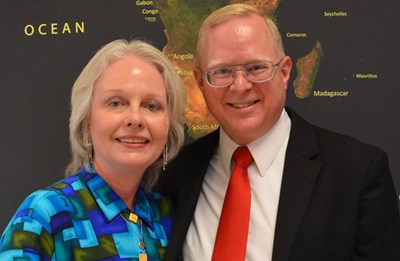
Copyright (c) 2016 Baptist Press. Reprinted from Baptist Press (www.baptistpress.com), news service of the Southern Baptist Convention. The original story can be found at http://www.bpnews.net/47653/missionary-to-russia-loses-antievangelism-appeal

Ruth and Donald Ossewaarde ORYOL, Russia (BP) — A Baptist missionary convicted under Russia’s new anti-evangelism law and compelled to end his ministry there has lost his first court appeal in Oryol, Russia, but has vowed to continue legally fighting for the cause of religious freedom.
An appeals court judge Sept. 30 upheld the conviction of Donald Ossewaarde on charges of conducting missionary activities in violation of the new law that prohibits evangelizing outside church walls and without a government permit.
“[My attorneys] assured me that this case will play an important role in determining the future of religious freedom in Russia, not just for foreign missionaries, but also for ordinary Russian believers,” Ossewaarde updated readers on his webpage. “My attorneys are confident that the law is on our side, and the courts must eventually rule in our favor if any impartial justice can still be found in Russia.”
The Independent Baptist missionary had been charged Aug. 14 under Article 5.26, Part 5 of the new religion law for holding religious services in his home, advertising services on bulletin boards in nearby neighborhoods, and failing to give authorities written notification when he began his religious activities. He was fined 40,000 rubles, about $600, and advised by a court appointed attorney that anything might happen to his family while in Russia.
“I was hoping to wrap things up here and return to my family as soon as possible, but the issue is an important one, and duty demands that I press the case as far as I can,” Ossewaarde wrote on his website. “Obviously, [the judge’s decision] is a disappointment.”
The new law, which went into effect July 20, defines illegal evangelism as activity by an authorized representative of an officially registered religious organization who uses media to publicly spread the organization’s doctrine to non-members to convince them to join the group, Ossewaarde contends. He and his wife Ruth had been sent on the mission field by Faith (Independent) Baptist Church in Bourbonnais, Ill., and had raised financial support from churches across the U.S., but do not represent an official religious organization.
Speaking in his own defense at the Sept. 30 appeal hearing, which had been continued from Sept. 19, Ossewaarde summarized his passion for the ministry he had begun in Russia in 2002 when it became legal to preach, teach, evangelize and distribute literature there.
“I came here to exercise those constitutional rights, and I did so without any trouble for 14 years. A few months ago, when I heard about the Yarovaya Law (named for bill coauthor Irina Yarovaya) I thought that maybe the time had come when I could no longer legally share my faith,” Ossewaarde said. “I am determined to be a law-abiding citizen, and I would pack my bags and go back to America right now rather than violate the law.”
But the law does not define evangelism in a way that encompasses his ministry, Ossewaarde argues, even though he has ceased ministry in the country and plans to return to Illinois when his appeals are exhausted.
“Even though Russian is not my native tongue, even I was able to understand that my activity does not meet this definition, so I have not broken any laws,” Ossewaarde wrote in his latest case update. “I am exercising the rights guaranteed by the constitution and the laws of the Russian Federation.”
Ossewaarde has conducted street evangelism, distributed printed materials and held weekly Bible studies and prayer meetings in his home.
He was joined in court by attorneys, friends and representatives from the U.S. Embassy in Moscow. His wife Ruth returned to Illinois after the couple received what Ossewaarde called a thinly veiled threat against their lives. He believes Russia will amend the law to accomplish its intent, if needed.
“I really think that the political situation in Russia has reached a point where they are going to, one way or the other, they’re going to get rid of me,” he told BP. “So I really decided to end my operations here. It’s sad because there are people here that really enjoy what we do. It’s a big part of their life.”
Ossewaarde’s case has received international attention. He was arrested with five other ministers of various faiths and denominations within a month of the law’s passage. Fines were levied on them varying from 5,000 to 50,000 rubles, with only one man, a Hare Krishna, acquitted.
Ossewaarde continues to request Christian prayer.
“Please continue to pray. I am overwhelmed at the feedback I am getting from people in many countries who are following the case and praying for us,” he wrote on his webpage. “Your prayers are felt, and we need them now more than ever. God bless you.”
Related Stories:
- Russian anti-evangelism case appeal postponed
- Russian anti-evangelism law victim requests prayer
- ‘Sad’ Russian anti-evangelism law ends a ministry
Get Baptist Press headlines and breaking news on Twitter (@BaptistPress), Facebook (Facebook.com/BaptistPress) and in your email (www.bpnews.net/SubscribeBP).





